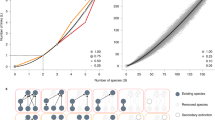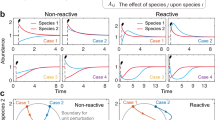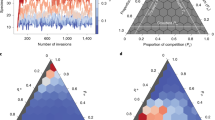Abstract
Most current theoretical work on whole ecological communities is based on a conception of community dynamics (see, for example, refs 1, 2) in which the community resides in a neighbourhood of equilibrium. However, there is very little evidence that this is a realistic viewpoint. To test this fundamental assumption ‘empirically’, I have constructed here plausible community matrices1,2 corresponding to 40 real food webs3 and studied their local stability properties. I find that stability (in the sense of tending to return to the presumed equilibrium after a small perturbation) is far more likely if the interaction strengths are chosen in accord with the nature of the particular organisms in each food web, rather than strictly at random. Either this is a monumental coincidence, or the equilibrium viewpoint really is appropriate for quite a few real communities. Additional results of this analysis are that stability generally requires a degree of intraspecific interference on the part of some consumer species, whereas interspecific interference tends to exert a destabilizing influence.
This is a preview of subscription content, access via your institution
Access options
Subscribe to this journal
Receive 51 print issues and online access
$199.00 per year
only $3.90 per issue
Buy this article
- Purchase on Springer Link
- Instant access to full article PDF
Prices may be subject to local taxes which are calculated during checkout
Similar content being viewed by others
References
May, R. M. Stability and Complexity in Model Ecosystems (Princeton University Press, 1974).
Levins, R. in Ecology and Evolution of Communities (eds Cody, M. L. & Diamond, J. M.) 16–50 (Harvard University Press, 1975).
Briand, F. Am. Nat. (submitted).
Pimm, S. L. & Lawton, J. H. Nature 275, 542–544 (1978).
Lawton, J. H. & Pimm, S. L. Nature 272, 189–190 (1978).
Hall, C. A. S. & Day, J. W. (eds) Ecosystem Modelling in Theory and Practice (Wiley, New York, 1977).
Lawlor, L. R. Am. Nat. 116, 394–408 (1980).
Hassell, M. P. J. Anim. Ecol 49, 603–628 (1980).
Auerbach, M. J. Nature 279, 821–822 (1979).
Saunders, P. T. Nature 272, 189 (1978).
Pimm, S. L. Nature 285, 591 (1980).
Rejmánek, M. & Starý, P. Nature 285, 591–592 (1980).
Birkhoff, G. D. Dynamical Systems (American Mathematical Society, New York, 1927).
Nemytskii, V. V. & Stepanov, V. V. Qualitative Theory of Differential Equations (Princeton Universiy Press, 1960).
Lorenz, E. N. J. atmos. Sci. 20, 130–141 (1963).
Rössler, O. E. Z. Naturforsch. 31 a, 259–264, 1664–1670 (1976).
Author information
Authors and Affiliations
Rights and permissions
About this article
Cite this article
Yodzis, P. The stability of real ecosystems. Nature 289, 674–676 (1981). https://doi.org/10.1038/289674a0
Received:
Accepted:
Issue Date:
DOI: https://doi.org/10.1038/289674a0
This article is cited by
-
Reactivity of complex communities can be more important than stability
Nature Communications (2023)
-
Colonization–competition dynamics of basal species shape food web complexity in island metacommunities
Marine Life Science & Technology (2023)
-
How diverse ecosystems remain stable
Nature Ecology & Evolution (2022)
-
Complexity–stability trade-off in empirical microbial ecosystems
Nature Ecology & Evolution (2022)
-
Loss of dominant caterpillar genera in a protected tropical forest
Scientific Reports (2020)
Comments
By submitting a comment you agree to abide by our Terms and Community Guidelines. If you find something abusive or that does not comply with our terms or guidelines please flag it as inappropriate.



